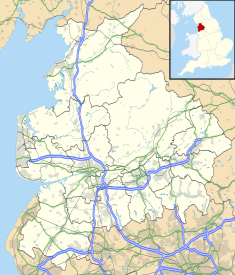| Marsh Farmhouse | |
|---|---|
| Marsh Farm Marsh House Farm | |
 The farmhouse in 1925 | |
| Location | Thornton-Cleveleys, Lancashire, England |
| Coordinates | 53°52′18″N3°01′09″W / 53.87162°N 3.01928°W |
| Area | Borough of Wyre |
| Built | 1803 |
Listed Building – Grade II | |
| Designated | 16 August 1983 |
| Reference no. | 1073153 |
Marsh Farmhouse is a historic building in Thornton-Cleveleys, Lancashire, England. Built in 1803, it is a Grade II listed building. [1] It is located to the southeast of today's Amounderness Way roundabout at Victoria Road East (known as Ramper Road at the time). [2]
Contents
The farmhouse is in brick with stone dressings, partly rendered, with a concrete tiled roof. It has two storeys and a symmetrical two-bay front. The central doorway has a semicircular relieving brick arch with stone imposts and a keystone inscribed with the name "B. F. Hesketh Esq 1803", [1] referring to Bold Fleetwood Hesketh, [2] son of Fleetwood Hesketh and Frances Bold. The windows are sashes. [3]
Hesketh died in 1819, aged 57, and was buried in the churchyard of St Chad's Church, Poulton-le-Fylde, alongside his parents. [4]




